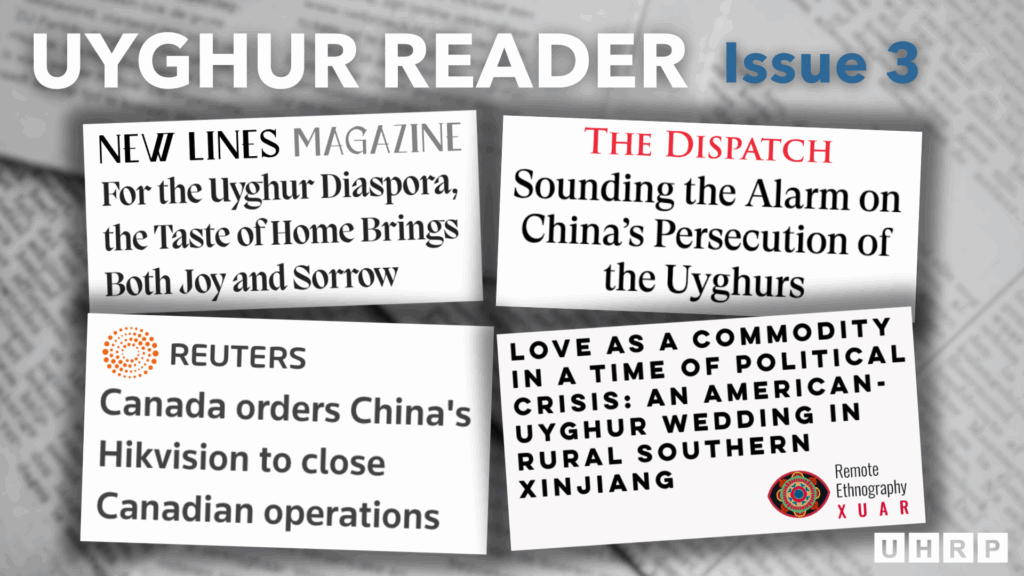The Uyghur Reader: Stories We’re Following (Issue 3)

Issue 3: June 26 – July 9, 2025
Welcome to the third issue of The Uyghur Reader, a biweekly content roundup curated by the staff of the Uyghur Human Rights Project.
Each issue features carefully selected articles, reports, and publications from media outlets, academic institutions, NGOs, and government sources. While we highlight urgent human rights issues, we also aim to reflect the breadth of the Uyghur experience, including politics, economics, history, and culture. Our goal is to provide a trusted resource for understanding the complexities and realities facing Uyghurs today.
This week’s selections come from Director of Research Henryk Szadziewski, Associate Director for Research and Advocacy Peter Irwin, and Chinese Outreach Coordinator Zubayra Shamseden.
📌 On July 8, Bloomberg published an investigation titled “China Wants 115,000 Nvidia Chips to Power Data Centers in the Desert,” by Andy Lin, Mackenzie Hawkins, Colum Murphy, and James Mayger, revealing that Chinese firms, with local government backing, are planning to install over 115,000 banned Nvidia AI chips in dozens of massive data centers across the Uyghur Region and neighboring Qinghai. Despite strict US export controls, documents and tender filings suggest that operators in the region intend to use these restricted semiconductors to train large language models, including for Chinese AI startup DeepSeek. The report uncovers how the arid, energy-rich Qumul region is being positioned as a future AI superhub, powered by solar, wind, and coal.
📌 In The Dispatch, Nyrola Elimä, a Uyghur-born researcher and journalist living in Sweden, shares with Jay Nordlinger her personal journey from assimilation in China to recognizing the severity of the genocide against Uyghurs—a realization prompted by the disappearance and mistreatment of her cousin. She speaks out internationally despite threats and trauma, urging the world to stop treating abuses in the Uyghur Region as business-as-usual and to choose sides between perpetrators and victims. “Sounding the Alarm on China’s Persecution of the Uyghurs” was published on July 2.
📌 On July 2, Liam Scott published a feature in New Lines Magazine, “For the Uyghur Diaspora, the Taste of Home Brings Both Joy and Sorrow,” exploring how food connects exiled Uyghurs to their culture. Centering on Jewher Ilham, daughter of imprisoned scholar Ilham Tohti, the piece shows how dishes like dumplings and kebabs evoke childhood joy but also highlight her father’s absence. Others in the diaspora, like journalist Gulchehra Hoja and restaurant owner Hamid Kerim, describe similar emotions, with Uyghur restaurants in the U.S. serving as spaces for cultural survival. The article also touches on forced labor in the Uyghur Region, particularly in the tomato industry, linking Uyghur food to ongoing abuses.
📌 Chinese/中文: A July 1 article from Radio France Internationale reports Canada is quietly implementing a three‑year resettlement program for tens of thousands of Uyghurs. Also, Taiwanese legislators and human rights advocates marked the 16th anniversary of the 2009 Ürümchi “7.5 Massacre,” urging the public to challenge Chinese propaganda by staying informed and defending the truth against censorship and cultural erasure, FTV News, June 30.
📌 On June 28, the Canadian government ordered Chinese surveillance giant Hikvision to close its Canadian operations amid national security concerns. Hikvision has been widely sanctioned for its role in supplying surveillance technology used to monitor and oppress Uyghurs in the Xinjiang Uyghur Region. Canada’s Industry Minister, Melanie Joly, said “The government has determined that Hikvision Canada Inc.’s continued operations in Canada would be injurious to Canada’s national security,” and added that the decision was taken after a multi-step review of information provided by the security and intelligence community in Canada. “Canada orders China’s Hikvision to close Canadian operations” by Kanishka Singh and Ismail Shakil, Reuters.
📌 On June 27, Marcel McDonald, writing for the Remote XUAR website, analyzes the marriage between an American influencer and a Uyghur man from a rural area of the Uyghur Region as a lens into the commodification of love, culture, and political narratives in China. “Love as a Commodity in a Time of Political Crisis: An American-Uyghur Wedding in Rural Southern Xinjiang” examines how the relationship is framed as a “true love” story, while becoming a vehicle for state propaganda, reinforcing the narrative of ethnic harmony and modernity in a region marked by atrocity crimes. The couple’s social media presence promotes sanitized, state-friendly imagery of Uyghur life while omitting key political and religious contexts. Ultimately, the story reveals a mutually beneficial arrangement between individuals and the state, where love and cultural representation are instrumentalized for political gain.
Keep reading:
- Rubinah Ahmad, Australian Muslim Times, June 30: The ‘Uyghur Resistance’: Stories of survival, culture and defiance
- William Zheng, South China Morning Post, July 1: China’s ethnic affairs overseer to take Communist Party helm in Xinjiang
- Shelly Kraicer, ChinaFile, July 3: Balancing What Can Be Said with What Can Only Be Implied: The films of Ikram Nurmehmet
- Global Voices Eurasia, July 8: Who makes contemporary Uyghur art in Kazakhstan?
